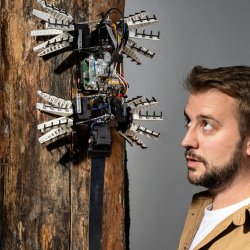Resilient biomimetic flight in cluttered environments
Start date
1 October 2024Duration
3.5 yearsApplication deadline
Funding source
UKRI and/or University of SurreyFunding information
We are offering the UKRI standard stipend (currently £18,622 per year) with an additional bursary of £1,700 per year for full 3.5 years for exceptional candidates. In addition, a research, training and support grant of £3,000 over the project is also offered. Full home or overseas tuition fees (as applicable) will be covered.
About
Unlike rotary-wing unmanned aerial vehicles (UAV), fixed-wing UAVs offer several advantages, including longer endurance, greater range, higher speed, larger payload capacity, improved stability in wind, energy efficiency, and reduced noise. However, current state-of-the-art fixed-wing UAVs suffer from limited manoeuvrability and require runways for landing. They are, therefore, not well-suited for close-quarters operations such as infrastructure inspections in dynamic environments (e.g. off-shore wind farms), urban search and rescue missions or for conducting aerial environmental monitoring of dense forests or vegetation, which may require flying in and out of wooded areas.
Flying and gliding [1] animals display the advanced manoeuvrability and perching capabilities necessary for close-quarters navigation. This project aims to find bioinspired solutions, using both experiments with aerial robots as well as high-fidelity computational fluid dynamics combined with machine learning, that will enable fixed-wing UAVs to perform advanced manoeuvres including perching, dynamic stall, high bank turns and dives, while resilient to wind gusts.
The project will combine cutting-edge robotic flight experiments with numerical simulations and machine learning techniques to improve our knowledge of transient aerodynamics, which is regarded as the main building block for advanced control systems enabling resilient flight.
The PhD research activity will include the development of biomimetic wings, to be used with an existing flight experiment, using a robotic catapult to produce flight data in an indoor flight arena. Ideally, these experiments will be matched with observations of bird flight using photogrammetry to measure the aerodynamics of live animals. It will also include the development and application of machine-learning techniques with sparse data to ensure interpretability, for instance via regularization techniques like Lasso [2], as well as the combination of deep learning and high-fidelity numerical simulation [3].
[1] R. Siddall, et al. (2021) https://doi.org/10.1038/s42003-021-02378-6
[2] A. Ghosh, D. Birch, O. Marxen (2020) https://doi.org/10.1109/JSEN.2020.2969286
[3] Z. Mao, L. Lu, O. Marxen, et al. (2021) https://doi.org/10.1016/j.jcp.2021.110698
Eligibility criteria
Open to both UK and international candidates.
Up to 30% of our UKRI-funded studentships can be awarded to candidates paying international rate fees. Find out more about eligibility.
You will need to meet the minimum entry requirements for our Aerodynamic and Environmental Flow PhD programme.
Due to the multi-disciplinary nature of the project, candidates from a wide background would be suitable, including graduates in aerospace and mechanical engineering, computational physics, applied mathematics, or closely related areas. Programming experience (Fortran, C/C++, Python) is a plus. Previous experience with the implementation and application of numerical methods and machine-learning techniques would be beneficial. The student should enjoy working in an team-oriented environment and be open to working outside strict discipline bounds. We welcome strong interpersonal skills and interest in sharing knowledge.
How to apply
Applications should be submitted via the Aerodynamic and Environmental Flow PhD programme page. In place of a research proposal, you should upload a document stating the title of the project that you wish to apply for and the name of the relevant supervisor.
Studentship FAQs
Read our studentship FAQs to find out more about applying and funding.
Application deadline
Contact details

Studentships at Surrey
We have a wide range of studentship opportunities available.


